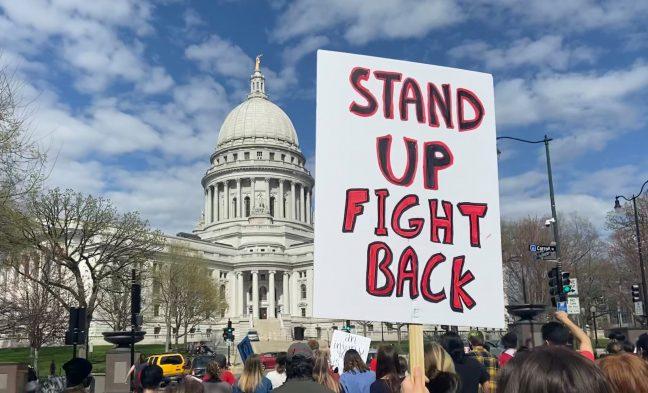Republican lawmakers in Wisconsin are trying to pass a law that will institute definitions and mandatory minimums for participating in “rioting.” The question raised, however, revolves not around how it will affect riots but instead how it will affect peaceful gatherings and protests.
The answer depends on the interpretation — and that’s a bad thing.
The law has two main parts: defining what a riot is legally, and outlawing specific actions relating to rioting. But, these definitions and laws are very unclear. The main problem with the definition of a riot is it does not only include violence already committed but also threats of violence.
Section 4.2. reads, “A threat to commit an act of violence made by one or more persons who are part of the unlawful assembly that has, individually or collectively, the ability to immediately execute the threat, if the performance of the threatened act of violence would constitute a clear and present danger of, or would result in, damage to the property of any other person or injury to another person.”
This means if someone threatens to commit violence and has the ability to act on it, the protest becomes a riot. This does not make sense and also has legal ramifications if combined with the new actions could make it illegal to “riot.”
The proposal would make it a felony to “substantial damage to property or personal injury,” which has a minimum sentence of 45 days in jail and a maximum penalty of three and a half years in prison. The misdemeanor provision of the bill for inciting or attending a riot has a minimum sentence of 30 days in jail or a maximum penalty of nine months.
Both of these provisions are not necessarily legally problematic on their own, but when combined, could lead to some weird outcomes. Does this mean that if you are at a protest and someone threatens to commit violence, you have to leave immediately?
Could a person opposed to the protest commit an act of violence and then implicate everyone else at the protest into the crime? Due to the vagueness of the bill, any of these situations are plausible. There are many different ways of interpretation that could lead to peaceful people being lobbed in with criminals.
It is a tricky issue because the law tries to frame itself as a law aimed at criminalizing rioting. There are, however, already laws on the books for that. Arson, assault and burglary are all already crimes.
If law enforcement was given the resources and the authority to arrest actual criminals, we could keep the communities safe from criminals who are doing real damage. They should not pass more legislation that can be applied to the actual rioters if they commit those acts of violence.
Don’t get me wrong, I do not think that rioting in your neighborhood and destroying local businesses is a good way to advocate for change. The damage done last summer certainly alienated several Republicans as well as the many people still undecided about whether to support the Black Lives Matter cause. Legislatures do have some responsibility to make sure riots do not happen again and people receive compensation for damaged businesses and possessions.
This might mean that they should plan ahead and bring in the National Guard to prevent situations from getting out of hand or increasing police funding so they could have more time for training around riot control and keeping their communities safe. But, this proposed law neither helps victims of riots nor officers in their pursuit of arresting actual criminals.
We have the First Amendment to protect our freedom of speech, assembly and press. Laws like this infringe on those rights by allowing people to be punished by damage done by others. If you do not damage any thing and follow all the laws, there should be no possibility you are framed as a criminal because of the actions someone else took without your consent.
This law could essentially prohibit any mass protest and even most large gatherings. Laws like this are fundamentally un-American and need to be seriously reconsidered before being passed. Not only is Senate Bill 296 unnecessary considering the current laws about damaging people and property — it infringes on our First Amendment rights and the values America was built on.
Jonathan Draeger (draegerrrr@gmail.com) is a freshman studying economics.


